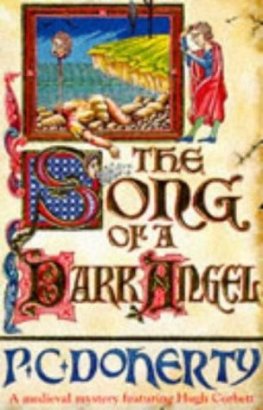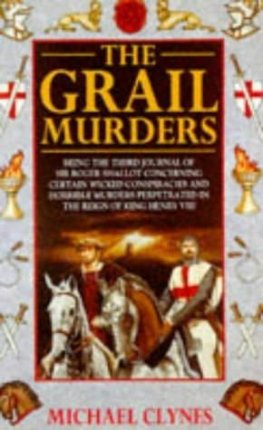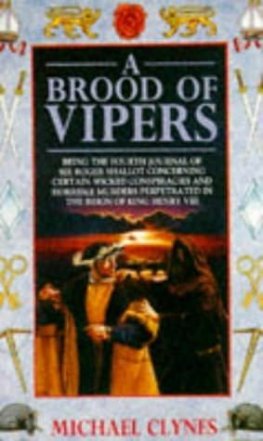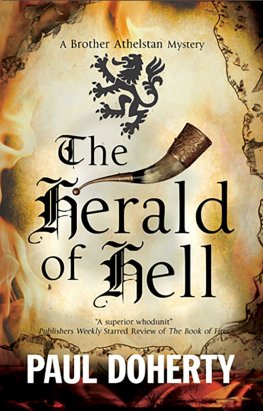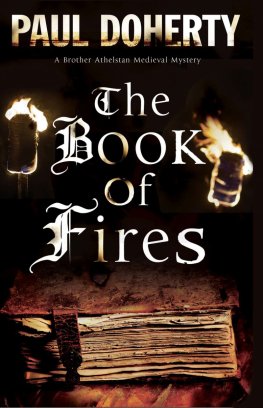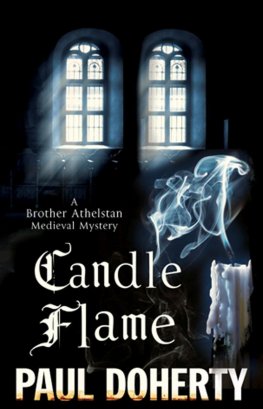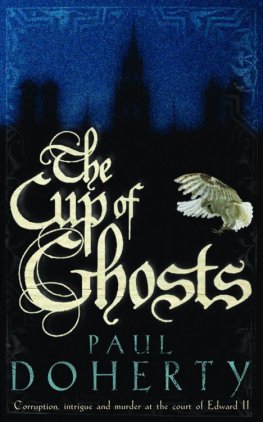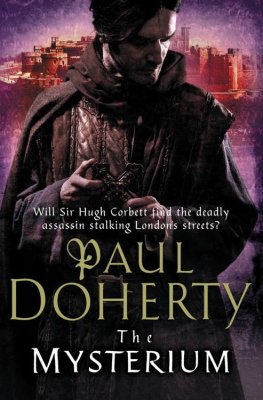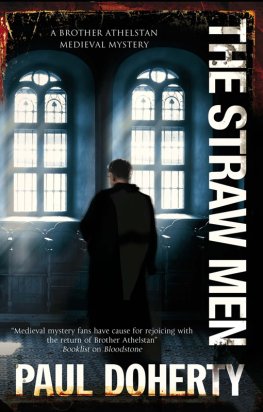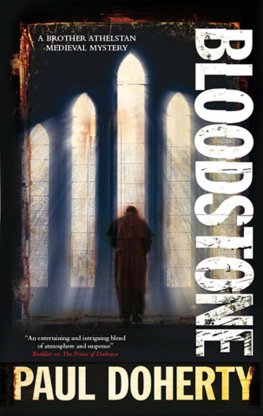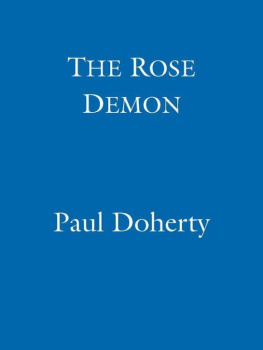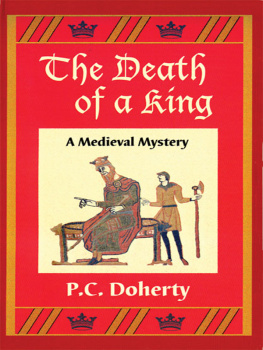Paul Doherty - Spy in Chancery
Here you can read online Paul Doherty - Spy in Chancery full text of the book (entire story) in english for free. Download pdf and epub, get meaning, cover and reviews about this ebook. genre: Detective and thriller. Description of the work, (preface) as well as reviews are available. Best literature library LitArk.com created for fans of good reading and offers a wide selection of genres:
Romance novel
Science fiction
Adventure
Detective
Science
History
Home and family
Prose
Art
Politics
Computer
Non-fiction
Religion
Business
Children
Humor
Choose a favorite category and find really read worthwhile books. Enjoy immersion in the world of imagination, feel the emotions of the characters or learn something new for yourself, make an fascinating discovery.
- Book:Spy in Chancery
- Author:
- Genre:
- Rating:4 / 5
- Favourites:Add to favourites
- Your mark:
- 80
- 1
- 2
- 3
- 4
- 5
Spy in Chancery: summary, description and annotation
We offer to read an annotation, description, summary or preface (depends on what the author of the book "Spy in Chancery" wrote himself). If you haven't found the necessary information about the book — write in the comments, we will try to find it.
Spy in Chancery — read online for free the complete book (whole text) full work
Below is the text of the book, divided by pages. System saving the place of the last page read, allows you to conveniently read the book "Spy in Chancery" online for free, without having to search again every time where you left off. Put a bookmark, and you can go to the page where you finished reading at any time.
Font size:
Interval:
Bookmark:
Paul Doherty
Spy in Chancery
ONE
The ship was in no danger despite the storm which raged out of the north to raise the waves and batter the craft. The master, John Ewell, a Southampton burgess and long-time mariner, knew these seas and sensed the temper of the storm. The ship was sturdy enough, two raised poops at either end to allow the archers protection when they fired, the mast was steep but sturdy and a look-out was posted high above the billowing sail just beneath the white red-crossed pennant of England. Ewell had every confidence in his deep-bellied ship and able crew, they were the least of his worries. He paced the deck, ice-blue eyes turned keenly seawards with the odd, sudden glance up to ensure his look-outs were equally attentive, constantly scanning the wind-blasted seas for pursuit.
Ewell congratulated himself. He had been successful, he had managed to slip his ship in and out of the Gascon port without hindrance. A short stay but long enough to pick up the small rolls of parchment sealed in their leather pouch and locked in the iron-bound chest in his narrow cabin. Edward of England would pay well for such reports: gold, special licences, even a knighthood. Despite the icy winds, Ewell hugged his own warmth and desperately wished for the calmer waters of the channel where his ship, the Saint Christopher, would find refuge.
Ewell felt exhilarated by what he had achieved. The goddam French may have overrun the English duchy of Gascony, seizing its cities, forts, castles and broken the wine trade between England and Bordeaux but, soon, the tables would be turned. Philip IV of France would kneel in the dust and beg forgiveness of Edward of England. Ewell stopped his pacing and stared into the middle distance, perhaps he would be there when it happened, Edward's captain, a burgess of Southampton, a knight with lands and titles bestowed by a grateful King. Ewell's dreams were suddenly shattered by a cry from the look-out high on the mast.
'Sail! I see sail to the south-east! One, no, two cogs.' Ewell steeled himself and rushed to the rail but could see nothing through the driving rain.
'Where? Where?' he shouted back.
'To the south-east, two cogs, full armaments!'
'What designs do they show?' Ewell yelled back, his throat sore at competing with the wind.
'No colours. Two pennants from the masts!' came the reply.
Ewell hoped they were English. Oh, sweet Christ, he did! No longer the thoughts of land and knighthood but his pleasant-faced wife, young daughters and his beloved ship which strained under the wind. He knew, at the bottom of his heart, that the ships were French, sent in pursuit like greyhounds after a startled hare. Ewell stared around in disbelief, every inch of sail had been loosed to catch the wind, two men on the stern manned the huge tiller, the rest were either below or in the rigging awaiting orders. He turned and saw the white, anxious face of his bo'sun and steward, Stephen Appleby. Ewell checked the panic which clutched his own heart and stomach and tried to put a brave face on it.
'Rouse the men, Stephen,' he said quiedy. 'Give them helmets, sallets, cloaks, crossbows and a quiver of quarrels.' Stephen grimaced, nodded and went below, his shouts faint in the roaring wind.
In a while the men stumbled on deck, tired, drawn, white-faced as they fastened their leather jerkins, put on helmets, wrist-guards and desperately tried to keep the cords of their crossbows dry against the cutting rain. Ewell ordered them to their posts on the fighting castles at either end of the ship, as well as into the rigging which ran like snakes up the great central mast. He issued a further spate of orders and two young boys brought sand and salt to strew the slippery docks while another tried to light and heat a small, capped charcoal brazier beneath the mast. Ewell turned back to the rail and peered hopefully through the rain. He saw nothing but, straining his eyes, he suddenly glimpsed dull shapes. The French were upon him. Ewell cursed trying to conceal his panic. Perhaps he could out-run them. But it was early morning and a full day had to elapse before the darkness fell. The English captain knew, at the bottom of his heart, that his ship could not make it. He had no illusions about the French. They had little love for English sailors and the rules of chivalry did not apply to war at sea.
The weather did not break and by noon the French were closing in on them. Two huge cogs, merchantmen converted to war, their great sails had lent them speed, even time to separate so they came in on either side of the English ship. Ewell saw the blue flags adorned with the silver lilies and, more foreboding, beneath them, the Oriflamme pennant which indicated that the French were not taking prisoners. The huge poops of the French were crowded with archers, the decks glistened with massed armour and Ewell saw the faint plume of black smoke which showed that the French had catapults. Ewell looked around in desperation, there was little he could do, surrender was out of the question for, at sea, prisoners were rarely taken. He breathed deeply, prayed to St. Anne and put on his rust-stained breastplate and battered steel helmet. The French closed in on either side, their catapults sending huge, glowing balls of fiery pitch up into the dull grey skies. The first one missed but soon they found their range and a rain of fire fell on the Saint Christopher.
The pitch caught the sail, the rigging and woodwork and the tongue of flame licked greedily and grew. The crew made frantic attempts to douse the flames with sand and water but to no avail. Other missiles, huge fiery black clumps caught the sails, turning them into curtains of fire, while the look-outs, trapped in the rigging, screamed and fell in flames to the deck. Ewell shouted at his archers to loose and turned just in time to see one of the French ships crash alongside, its soldiers pouring like a river over its side. The English archers accounted for a few who screamed and twirled as the ugly, jagged crossbow quarrels ripped the flesh of chest and neck, but the French were too many. The second ship also closed, disgorging its troops.
Ewell turned, he would reach his cabin, deny the French that leather, wax-sealed pouch but an arrow caught him full in his exposed throat and he crashed to the deck. He thought he could still move but the blood pumped through his mouth, he saw the blurred faces of his wife, his eldest child and the darkness came crashing down about him. Within an hour the Saint Christopher was blazing from the prow to stern. The French ships stood off, their crews watching the bowsprit dip into the waves, its grim burden, the body of the bo'sun, still jerking and twisting. Stephen Appleby died slowly. The noose around his neck strangling off his breath but, just before he died, even in his death agonies, he wondered,
once again, how the French had known and found his ship.
In the rue Barbette in Paris, Nicholas Poer hunched over his bowl of rancid meat, leeks and onions, slurping from the horn spoon he always carried with him. He stared round the dirty tavern, slyly studying the other customers sitting on up-turned barrels of broken stools. The place was poorly lighted by thick tallow candles which gave off a putrid smell. Poer did not like it, he heard a rat rustle the dirty straw which covered the earth-packed floor and turned back to his food, wondering what he was really eating. He raised the battered pewter tankard and drained its contents, the raw beer stinging the sores in his mouth. He felt frightened, almost shaking with panic though he tried to conceal it, drawing comfort from the long dagger he clutched under his cloak.
Of Gascon parents, Poer spoke fluent French and knew Paris well. He had always been confident in his disguise, no one would suspect that this greasy-haired, shabby, unshaven individual was a trained clerk of the Royal Exchequer of England, Edward I's highly trained spy sent to Paris to collect and send back information. Poer had moved easily around the city, crossing skilfuUy from the underworld on the left bank of the Seine to the slovenly splendour of the royal household in the Louvre. Poer had, in recent weeks, been excited by what he had discovered. The French king, together with his brothers, Charles and Louis, was planning another move against Edward of England. Something breathtaking, a Grand Design, so an usher of the court had assured him when deep in his cups: Poer believed he had to discover what it was yet recently he had become afraid.
Font size:
Interval:
Bookmark:
Similar books «Spy in Chancery»
Look at similar books to Spy in Chancery. We have selected literature similar in name and meaning in the hope of providing readers with more options to find new, interesting, not yet read works.
Discussion, reviews of the book Spy in Chancery and just readers' own opinions. Leave your comments, write what you think about the work, its meaning or the main characters. Specify what exactly you liked and what you didn't like, and why you think so.


